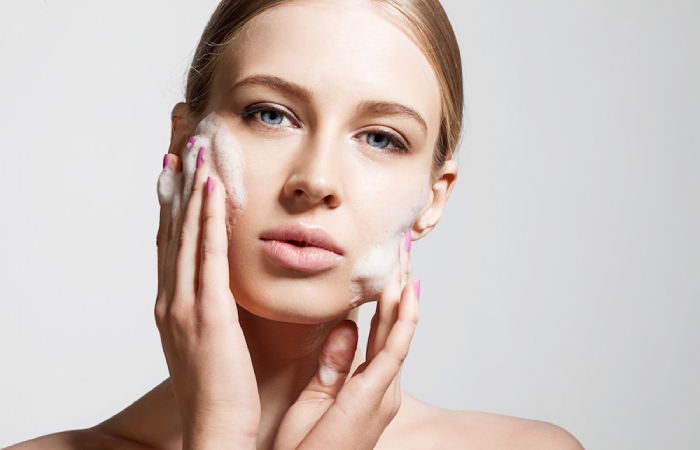Having sensitive skin often means acting carefully, with a gentle touch and a deep sympathy for what works for your sensitive skin. It’s a delicate balance to strike, especially when faced with many product options. In this guide, we’ll dive into creating a skincare routine that respects the fragility of sensitive skin and nourishes and protects it.
Understanding Sensitive Skin

It’s essential to understand what sensitive skin means. People with this skin type experience intense reactions to certain ingredients, causing irritation, redness, itching, and sometimes even peeling or rash. The key is identifying products free of irritants and formulated to soothe and strengthen the skin barrier.
Importance of a Gentle Exfoliator (Sensitive Skin)
While exfoliation is vital to maintaining healthy skin, it requires a careful approach for. Exfoliating agents should be gentle to avoid irritating the skin. For people with, exfoliating can cause some apprehension.
However, glycolic acid presents a different narrative: rejuvenation without harshness. By choosing products based on glycolic acid, you can enjoy the welfares of glycolic acid without fear. This means that even the most can benefit from the shine and clarity of gentle, regular exfoliation.
Including glycolic acid in a skin care regimen is not just about removing dead cells; It is a testament to the advanced understanding of skin health. When used carefully, glycolic acid can help with hydration, improving skin texture and overall radiance.
This is a testament to the fact that sensitivity does not have to limit your quest for healthy, glowing skin. Thanks to glycolic acid, can regain its balance and flourish.
Choosing the Right Cleanser
The first step in any skincare monotonous is cleansing, but choosing the right product is essential for. Opt for a gentle, hydrating cleanser that removes impurities deprived of stripping the skin of its natural oils. A creamy, fragrance-free formula is best suited as it is less likely to cause unwanted effects.
Hydration and Moisturization (Sensitive Skin)

Consistent hydration is vital for that tends to dry out more quickly. Look for moisturizers with soothing fixings like aloe vera, glycerin, and hyaluronic acid. These ingredients are known for their ability to lock in dampness and create a protective barrier on the skin. Selecting a moisturizer designed specifically for can prevent irritation.
The Role of Sun Protection
Never underestimate the importance of sunscreen. Regardless of skin type, daily sunscreen application with an SPF of 30 or advanced is vital. For, mineral sunscreens covering zinc oxide or titanium dioxide are preferred because they are less likely to cause a reaction and provide broad-spectrum protection.
Targeted Treatments
When considering adding treatments or serums to address specific anxieties like dark spots or fine lines, it’s essential to do so with caution for sensitive skin. Products containing retinoids or vitamin C may be too strong and cause more inflammation and discomfort. Look for formulas suitable for sensitive skin and perform a patch test before widespread use.
The Importance of Testing (Sensitive Skin)
Patch testing is a protective step you shouldn’t skip when introducing a new product into your skincare routine. Apply a small amount of product to an inconspicuous area and wait 24 to 48 hours to observe a possible reaction. This will minimize the risk of a complete skin reaction.
Daily Sensitive Skin Care Routine

Combining careful product selection with a consistent routine is critical to managing. Start your day with a gentle cleanse, followed by moisturizer and sunscreen application. In the evening, wash again to remove the day’s dirt, apply a suitable moisturizer, and, if your skin tolerates it, include a gentle exfoliant once or twice a week.
Final Thoughts and Skincare Tips
Treating doesn’t have to be a daunting task. If you are picky about product ingredients and pay attention to how your skin reacts, you can develop a routine to keep your skin calm and clear. Remember, the simpler the routine, the less likely you encounter irritants. Listen to your skin, and don’t hesitate to consult a dermatologist to design a routine as unique as yours.

